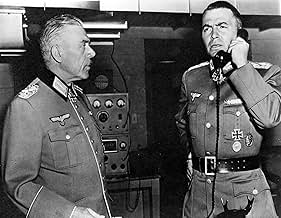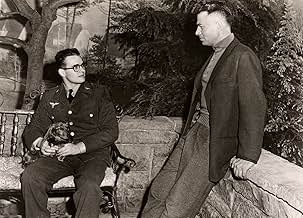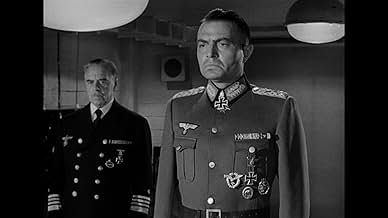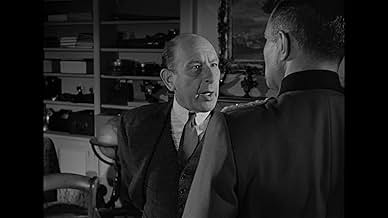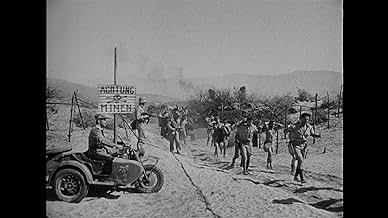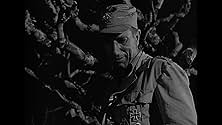AVALIAÇÃO DA IMDb
6,9/10
7 mil
SUA AVALIAÇÃO
Adicionar um enredo no seu idiomaThe story of the final years of the respected World War II German general, Erwin Rommel.The story of the final years of the respected World War II German general, Erwin Rommel.The story of the final years of the respected World War II German general, Erwin Rommel.
- Direção
- Roteiristas
- Artistas
- Prêmios
- 1 vitória no total
Philip Ahlm
- German Soldier & Chauffeur
- (não creditado)
John Alderson
- German Sergeant
- (não creditado)
- …
Jack Baston
- Gen. Alfred Jodl
- (não creditado)
Robert Bohannon
- Minor Role
- (não creditado)
Boyd Cabeen
- Minor Role
- (não creditado)
Roland Carpenter
- German Officer
- (não creditado)
Mary Carroll
- Rommel's Maid
- (não creditado)
Steve Carruthers
- Signal Man
- (não creditado)
- Direção
- Roteiristas
- Elenco e equipe completos
- Produção, bilheteria e muito mais no IMDbPro
Avaliações em destaque
Though The Desert Fox is good as far as it goes and James Mason is perfectly cast as Erwin Rommel, one would hope that a fuller biographical study might be done on the screen.
Erwin Rommel was one of a group of like minded military leaders in various countries who after World War I, rose to the top of their country's military establishment because they saw the value of the tank in any future war. Some of those people would be Charles DeGaulle in France, Dwight Eisenhower and George Patton in America, Marshal Tukachevksy in the Soviet Union and Rommel in Germany.
In 1942 Hitler as he was constantly doing sent Rommel in to bail out the Italians who up to that point had been running the desert campaign in North Africa. With less men and supplies, his tactical ability bedeviled the Allied command until The Second Battle of El Alamein.
The film starts with Rommel as desert warfare genius and then when he does become ill and is invalided out of North Africa, the Allies regain the initiative and beat his famed Afrika Korps. Rommel is then sent to Western Europe to supervise the defenses on the Atlantic.
There comes a point when Rommel does realize that his Fuehrer is destroying his country and becomes involved in the plot to kill him and overthrow the government. That is what most of the film deals with.
James Mason is a stalwart Rommel a perfect conception of the man they called The Desert Fox. In this mostly male film, Jessica Tandy has little to do but be loyal and supportive as Frau Rommel.
Luther Adler who among other parts he played in his long distinguished career was David Ben-Gurion. He goes the whole opposite way in his portrayal of a ranting and malevolent Adolph Hitler. How a man who took his Jewish heritage as seriously as Luther Adler did, prepare for the role of Hitler is beyond my scope. But then again, there were few actors as good as he.
Though Mason does a fine job given what limited material he had to work from, archives have been opened and we know a whole lot more about Erwin Rommel. Time for another biographical study.
Erwin Rommel was one of a group of like minded military leaders in various countries who after World War I, rose to the top of their country's military establishment because they saw the value of the tank in any future war. Some of those people would be Charles DeGaulle in France, Dwight Eisenhower and George Patton in America, Marshal Tukachevksy in the Soviet Union and Rommel in Germany.
In 1942 Hitler as he was constantly doing sent Rommel in to bail out the Italians who up to that point had been running the desert campaign in North Africa. With less men and supplies, his tactical ability bedeviled the Allied command until The Second Battle of El Alamein.
The film starts with Rommel as desert warfare genius and then when he does become ill and is invalided out of North Africa, the Allies regain the initiative and beat his famed Afrika Korps. Rommel is then sent to Western Europe to supervise the defenses on the Atlantic.
There comes a point when Rommel does realize that his Fuehrer is destroying his country and becomes involved in the plot to kill him and overthrow the government. That is what most of the film deals with.
James Mason is a stalwart Rommel a perfect conception of the man they called The Desert Fox. In this mostly male film, Jessica Tandy has little to do but be loyal and supportive as Frau Rommel.
Luther Adler who among other parts he played in his long distinguished career was David Ben-Gurion. He goes the whole opposite way in his portrayal of a ranting and malevolent Adolph Hitler. How a man who took his Jewish heritage as seriously as Luther Adler did, prepare for the role of Hitler is beyond my scope. But then again, there were few actors as good as he.
Though Mason does a fine job given what limited material he had to work from, archives have been opened and we know a whole lot more about Erwin Rommel. Time for another biographical study.
Wonderful performances, first-rate script and direction (moving musical score in key places, as well), plus a well-structured theme about moral dilemmas of patriotic soldiers who realize they're obeying evil orders, make this a little-known gem.
Did Rommel really participate in the plot to kill Hitler? Hitler sure thought so. He had his favorite general poisoned; about that there is no question.
Did Rommel know Hitler before the war? Not sure when they became acquainted but Rommel ran AH's bodyguard unit for a while, then became one of Hitler's favorite generals when he helped sweep the British to Dunkirk in 1940.
Was Rommel aware of and morally responsible for the Holocaust? A recent award winning Rommel biography cites one scene I wish they could have included in this film: Rommel around 1941 advised Hitler that he was concerned by Allied carping on German anti-semitism. "Why don't we put some Jews into prominent leadership positions and shut them up?" Rommel suggested. Hitler told Rommel to stick to military matters and, after the general exited the room, told associates: "That fellow has absolutely no understanding of what we are trying to accomplish."
The movie does generally succeed in portraying the theme of a soldier so single-mindedly focused on the professional technique of his job that he only slowly awakens to the moral horror and self-destructiveness of the leader he serves.
The Churchill quote used at the film's ending is meant to address (and answer) the questions about whether it is morally proper to make a film that glorifies a Nazi general. If Churchill could say such magnanimous things about him...and it's an accurate quote...then so could Hollywood.
(Interesting historical note: British film audiences in the early 1950s were not in such a generous mood. The studio quickly churned out the much-inferior "Desert Rats" film, featuring Mason as a more-villainous Rommel, to mollify outraged critics.)
Where did the quote come from that is spoken in this film by von Reunstadt: "Victory has a thousand fathers, but defeat is an orphan"? Yes, JFK used it, famously, after the Bay of Pigs fiasco. Many newsmen of the time mistakenly credited the president with originating it, but JFK didn't claim credit for it. The line has since been traced back to some Italian count in the 1500s. His name was Ciano or something like that. But JFK was a big movie fan and, my guess is, probably learned this aphorism from "The Desert Fox" a decade before using it in his famous post-Bay of Pigs press conference!
Did Rommel really participate in the plot to kill Hitler? Hitler sure thought so. He had his favorite general poisoned; about that there is no question.
Did Rommel know Hitler before the war? Not sure when they became acquainted but Rommel ran AH's bodyguard unit for a while, then became one of Hitler's favorite generals when he helped sweep the British to Dunkirk in 1940.
Was Rommel aware of and morally responsible for the Holocaust? A recent award winning Rommel biography cites one scene I wish they could have included in this film: Rommel around 1941 advised Hitler that he was concerned by Allied carping on German anti-semitism. "Why don't we put some Jews into prominent leadership positions and shut them up?" Rommel suggested. Hitler told Rommel to stick to military matters and, after the general exited the room, told associates: "That fellow has absolutely no understanding of what we are trying to accomplish."
The movie does generally succeed in portraying the theme of a soldier so single-mindedly focused on the professional technique of his job that he only slowly awakens to the moral horror and self-destructiveness of the leader he serves.
The Churchill quote used at the film's ending is meant to address (and answer) the questions about whether it is morally proper to make a film that glorifies a Nazi general. If Churchill could say such magnanimous things about him...and it's an accurate quote...then so could Hollywood.
(Interesting historical note: British film audiences in the early 1950s were not in such a generous mood. The studio quickly churned out the much-inferior "Desert Rats" film, featuring Mason as a more-villainous Rommel, to mollify outraged critics.)
Where did the quote come from that is spoken in this film by von Reunstadt: "Victory has a thousand fathers, but defeat is an orphan"? Yes, JFK used it, famously, after the Bay of Pigs fiasco. Many newsmen of the time mistakenly credited the president with originating it, but JFK didn't claim credit for it. The line has since been traced back to some Italian count in the 1500s. His name was Ciano or something like that. But JFK was a big movie fan and, my guess is, probably learned this aphorism from "The Desert Fox" a decade before using it in his famous post-Bay of Pigs press conference!
While a highly rewatchable war movie, with a corker of a performance from James Mason, this motion picture does have its inaccuracies--beginning with its memorable opening. In truth, British commandos did not sneak or charge in, outfitted in nightfighting fatigues; they simply walked in, disguised in Axis uniforms with fake ids. Though the covert mission proved a fiasco, Rommel, in true chivalrous tradition, had these would-be assassins buried with full military honors. However, cinematically-speaking, it's a gripping moment, and it's considered the first true pre-credit movie sequence, a trick one would see quite often in later movies, such as the Bond films and others.
The movie focuses largely on the Field Marshall's involvement with the attempted assassination of Hitler, but just how much (or how little) Rommel was involved is still arguable. Curiously, James Mason once mentioned how he was up for the part of Rommel and was competing with another Fox contract-player, Gary Merrill (best known as Bette Davis's love interest in ALL ABOUT EVE). Mason was impressed by how well Merrill marched and strutted, doing bits of military-like physical action that didn't come easily to the urbane Mason. Even though Mason ultimately won the part over Merrill, he self-critically felt he didn't fully do the role justice (though many, including myself, wouldn't agree with him). Perhaps the studio opted for Mason to bring out a sympathetic quality, because viewers do tend to forget the numbers of Allies who died directly because of the main character! Rommel was a great general for his energetic and ingenious tactics, not for (possibly) wanting Hitler killed.
Don't get me wrong; this movie is still a joy.
The movie focuses largely on the Field Marshall's involvement with the attempted assassination of Hitler, but just how much (or how little) Rommel was involved is still arguable. Curiously, James Mason once mentioned how he was up for the part of Rommel and was competing with another Fox contract-player, Gary Merrill (best known as Bette Davis's love interest in ALL ABOUT EVE). Mason was impressed by how well Merrill marched and strutted, doing bits of military-like physical action that didn't come easily to the urbane Mason. Even though Mason ultimately won the part over Merrill, he self-critically felt he didn't fully do the role justice (though many, including myself, wouldn't agree with him). Perhaps the studio opted for Mason to bring out a sympathetic quality, because viewers do tend to forget the numbers of Allies who died directly because of the main character! Rommel was a great general for his energetic and ingenious tactics, not for (possibly) wanting Hitler killed.
Don't get me wrong; this movie is still a joy.
The story of the final years of the respected World War II German general, Erwin Rommel (James Mason).
I really didn't know much about Rommel going in to this film, and I don't know if I know all that much more coming out of it. Apparently he was British? And he answered to a silly Hitler that seemed liked a caricature of the real thing? I joke, but it is amusing how movies used to make no attempt whatsoever to get people's nationality correct.
Beyond that, the film is actually fairly decent because it operates more or less as a one man show for James Mason. And Mason is a joy to watch (and an even bigger joy to listen to). Not a bad story, either, although I am not sure how openly people were calling Hitler "evil" and trying to overthrow him.
I really didn't know much about Rommel going in to this film, and I don't know if I know all that much more coming out of it. Apparently he was British? And he answered to a silly Hitler that seemed liked a caricature of the real thing? I joke, but it is amusing how movies used to make no attempt whatsoever to get people's nationality correct.
Beyond that, the film is actually fairly decent because it operates more or less as a one man show for James Mason. And Mason is a joy to watch (and an even bigger joy to listen to). Not a bad story, either, although I am not sure how openly people were calling Hitler "evil" and trying to overthrow him.
This is a pretty solid attempt to portray a soldier's great dilemma - balancing loyalty to the state and obedience to orders with the higher calling of loyalty to what's right and just. Erwin Rommel was one of the great German generals of World War II (a hero in Germany and respected by the Allies.) In the end, he also became involved with the conspiracy against Hitler. The movie shows us some of that development, beginning with his incredulousness at Hitler's orders that the Afrika Korps stand and fight to the last man in Africa rather than withdrawing to fight another day. According to the movie, it was this "stand and fight to the last man" attitude of Der Fuhrer that finally pushed Rommel over the edge. That makes Rommel consistent with what I know of most of the leaders of the "resistance" (such as it was) to Hitler. The opposition wasn't political; it wasn't based on a rejection of Nazi ideology or distaste for Hitler's racial policies - it tended to be based simply on the belief that Hitler was leading Germany to defeat in the war. That's the overarching sentiment portrayed here. That being the case, Rommel may not have been the sympathetic character this movie makes him out to be - maybe he just had the smarts to realize that Germany was fighting a losing war. There's also no mention of his performance during the German invasion of France in 1940, in which Rommel - as a panzer commander - received some German criticism for both his tactics and his tendency to exaggerate his achievements.
James Mason was very good as Rommel. His portrayal was believable, although I wish there had been more exploration in the story of where Rommel came from rather than simply starting us abruptly in Africa. Made only 6 years after the end of the war, the movie is also somewhat courageous in presenting a German general (even one who was unsympathetic to Hitler) in such a sympathetic light. I didn't find this to be structured particularly well. There was too much narration involved, which seemed put an end to any flow the movie might have been trying to develop. Some scenes (particularly of the Allied landings on D-Day) featured a little too much patriotic American and British and French music as the troops went ashore (frankly, listening to the Marine Fight Song or The Marseillaise in a movie about Rommel seemed a bit silly.)
It's an interesting movie, but doesn't seem to completely capture the man it portrays.
James Mason was very good as Rommel. His portrayal was believable, although I wish there had been more exploration in the story of where Rommel came from rather than simply starting us abruptly in Africa. Made only 6 years after the end of the war, the movie is also somewhat courageous in presenting a German general (even one who was unsympathetic to Hitler) in such a sympathetic light. I didn't find this to be structured particularly well. There was too much narration involved, which seemed put an end to any flow the movie might have been trying to develop. Some scenes (particularly of the Allied landings on D-Day) featured a little too much patriotic American and British and French music as the troops went ashore (frankly, listening to the Marine Fight Song or The Marseillaise in a movie about Rommel seemed a bit silly.)
It's an interesting movie, but doesn't seem to completely capture the man it portrays.
Você sabia?
- CuriosidadesErwin Rommel's widow, Lucie Marie Rommel acted as a technical consultant and adviser to this movie. She was played by Jessica Tandy in the film itself. Mrs. Rommel lent the production some of her husband's personal artifacts and liaised with Nunnally Johnson, the film's producer and screenwriter. As Frau Lucie Maria Rommel, Mrs Rommel later also acted as a military consultant to the film O Mais Longo dos Dias (1962) made by 20th Century-Fox, the same studio that produced this movie.
- Erros de gravaçãoThe opening commando raid shows at least a dozen German soldiers killed. In reality, only four were killed.
- Citações
Field Marshal Gerd von Runstedt: [It's] too late for me. I'm seventy now - too old to fight, too old to challenge authority, however evil... but not too old, however, to wish you and your friends the best of luck in their extremely interesting enterprise.
- Cenas durante ou pós-créditosThe 20th Century Fox logo appears without the usual fanfare.
- ConexõesEdited from Vitória no Deserto (1943)
- Trilhas sonorasThe Army Air Corps Song
(uncredited)
Music by Robert Crawford
Heard during the scenes of D-Day and the ensuing battles
Principais escolhas
Faça login para avaliar e ver a lista de recomendações personalizadas
- How long is The Desert Fox: The Story of Rommel?Fornecido pela Alexa
Detalhes
- Tempo de duração1 hora 28 minutos
- Cor
- Proporção
- 1.37 : 1
Contribua para esta página
Sugerir uma alteração ou adicionar conteúdo ausente

Principal brecha
By what name was A Raposa do Deserto (1951) officially released in India in English?
Responda

